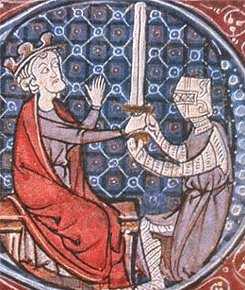One of the things I notice from reading unpublished authors’ fantasy novels is that we Americans don’t have a lot of grounding in the ranks of nobility. Kings, dukes, barons: they are more than fancy titles. They actually mean something.
A full treatise on the subject would occupy many pages. This is primer.
- Emperor or Empress: rules an empire of kingdoms
Caesar is the Roman term for their emperor, from which Czar and Kaiser descend. - King or Queen: rules a kingdom
Mahajari or Maharani is the Indian high king or queen. - Archduke or archduchess: rules an archduchy, considered a monarch in his or her own right.
Also Grand Duke or Grand Duchess, basically the same. - Crown Prince: is the acknowledged heir to the throne
The Prince of Wales is England’s Crown Prince; the Dauphin is the Crown Prince of France. - Prince or Princess: the sons, daughters, and grandchildren of the king or queen
Prince is also a generic term for any ruler, particularly amongst themselves. - Duke or Duchess: rules a duchy
There are eleven dukes in the modern England. - Marchess or Marchioness: is a ruler of a land that borders another country.
Also Margrave in Germany. The title originally designated a military commander tasked with defending a border. - Count or Countess: rules a county
In England, they are called Earls. There are about thirty earls in England. - Viscount or Viscountess: is either the ruler of a viscounty or the descendent of deputy of a count
The French use Vicomte. England has three viscounts. In some kingdoms, viscount is not hereditary. - Baron or Baroness: the lowest rank of nobility, barons rule a barony
England has almost sixty barons. This is the bulk of any kingdom’s noble class. - Knights or Dames: this a granted title, not hereditary, that elevates someone into peerage
Military prowess is the surest way to become a knight, but it can and is granted for other services. The King or Queen may delegate his or her ability to knight people or not. Lesser nobles got in trouble for knighting people all the time.

